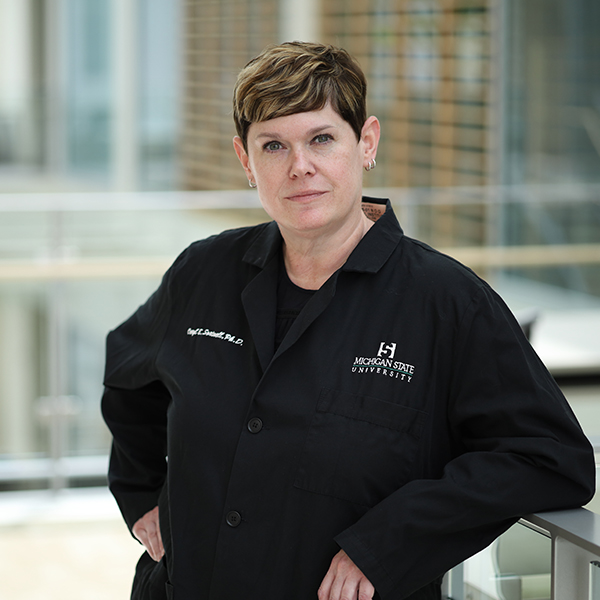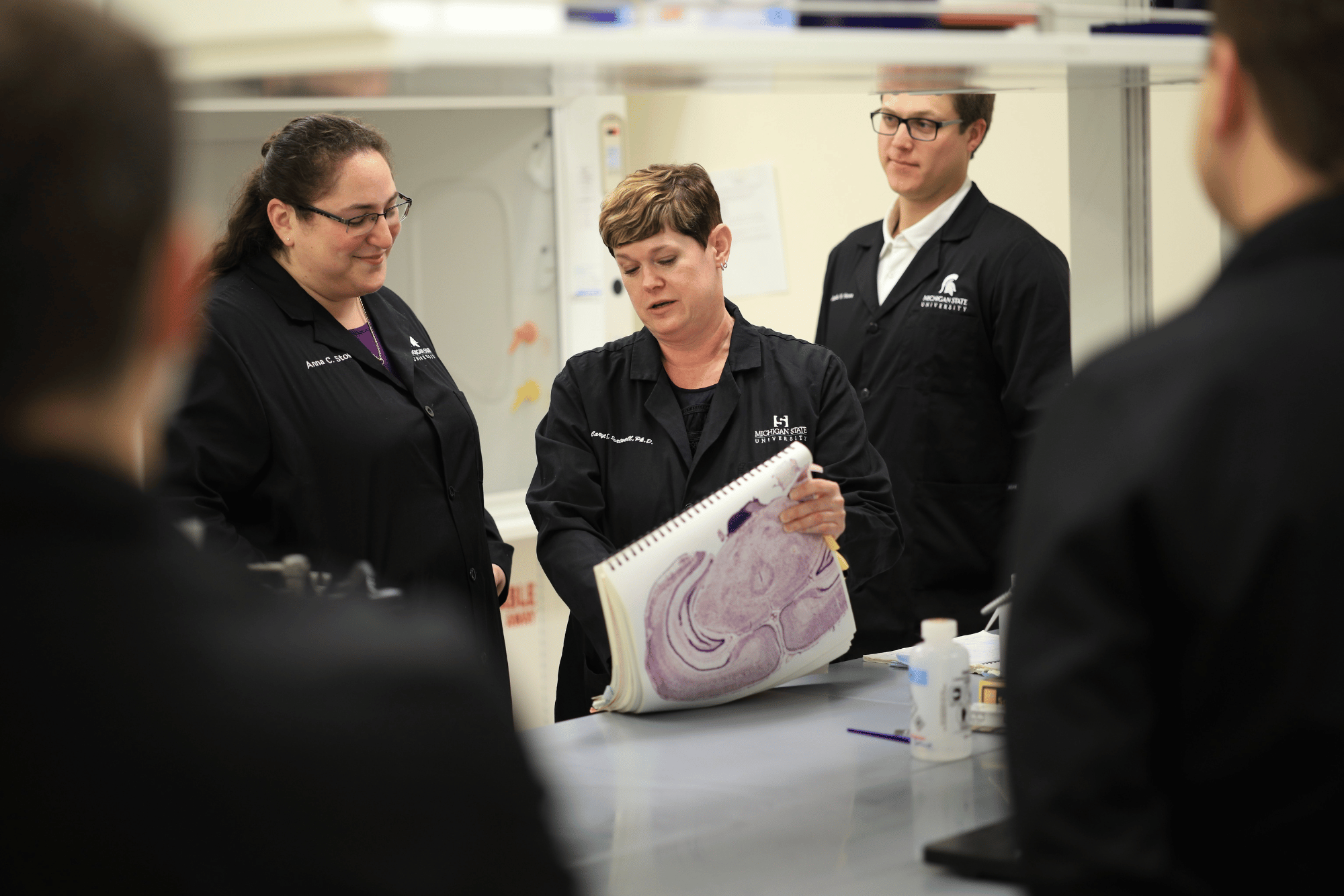Sortwell Named the Edwin A. Brophy Chair in Central Nervous System Disorders
Flexible funding will empower talented, experienced researcher to pursue solutions to Parkinson's Disease
 Michigan State University College of Human Medicine Department of Translational Neuroscience (TransNeuro) researcher and Professor Caryl Sortwell, PhD, has been named the recipient of the Edwin A. Brophy Chair in Central Nervous System Disorders.
Michigan State University College of Human Medicine Department of Translational Neuroscience (TransNeuro) researcher and Professor Caryl Sortwell, PhD, has been named the recipient of the Edwin A. Brophy Chair in Central Nervous System Disorders.
The endowed chair funding will help advance Sortwell’s groundbreaking research, which is focused on reducing symptoms and slowing the progression of Parkinson’s disease (PD)—a chronic, degenerative neurologic brain disorder—by providing scientific evidence to support clinical trials of disease-modifying therapies.
The urgency of Sortwell’s work grows each year. According to the Parkinson’s Foundation, 60,000 North Americans will be diagnosed with PD by the end of 2022; a growing number which will add to the over one million people in the U.S. living with PD, and over 10 million worldwide.
“The overall goal is to eliminate this disease altogether for those diagnosed, and to find ways for patients to outlive this chronic, degenerative disorder that so many suffer with,” Sortwell said. “While we may not find a cure in my lifetime, if we can stop the disease in its tracks, we can help make an immediate impact on people’s lives."
Collective power through collaboration
As a principal investigator at the Grand Rapids Research Center, Sortwell leads a small yet mighty team of junior PD researchers and staff: highly talented, bright minds examining and discovering new treatments; pushing forward scientific methodologies; and drawing on collaborative research to carefully examine the events associated with the parkinsonian brain.
The “holy grail” of Parkinson's research is finding a way to prevent neurons from dying. Sortwell is a big believer in collaboration propelling the team toward that goal.
“We’re absolutely smarter when we work collectively,” Sortwell said. “My research model is highly collaborative, because I think having more expert eyes looking at the same problems from different angles will lead to different solutions, faster."

The pandemic years have illuminated the importance of having good scientists in the world from all walks of life. Sortwell (center) is creating a fertile environment where trainees can ideate and learn together. (Above: Anna Stoll (left) and Jacob Howe (right), both graduate assistants in Sortwell's lab.)
Working alongside TransNeuro colleagues, key collaborators in East Lansing, and movement disorder clinicians in Grand Rapids at Spectrum Health and Mercy Health, Sortwell can selectively adapt the best approaches for her lab. In fact, she admits that by having the ability (and humility) to “phone a friend” has saved time—a precious commodity for researchers who can spend hundreds of hours throughout their careers writing grant proposals.
Time that could be spent on finding a new PD treatment or solution.
Philanthropic sources like the Brophy Chair allows Sortwell to not only free up that time, but gives access to flexible funding; which she plans to put toward supporting lab employees and gathering pilot data to garner larger research grants and supporting junior scientists. A small amount of the funds will go toward purchasing new equipment.
In addition, and perhaps the most crucial piece, is that the $120K endowed fund acts as a springboard, giving Sortwell the ability to pursue new and exciting ideas that traditional funders deem too risky. Through the Brophy family’s gift, the PD team will gather preliminary data then use it to garner additional funds from sources like the NIH.
Sortwell credits much of her lab's success thus far to those who have mentored her, her dedicated lab staff and the next generation of scientists she trains. The endowed funds will anchor her laboratory, retaining those with vast scientific knowledge and drawing new talent to MSU.
From Small Seed to Massive Impact
The TransNeuro Department, led by Chair Dr. Jack Lipton, was built from the ground up. Coming to MSU in 2009 as part of a four-researcher nucleus led by Lipton, Sortwell has since garnered approximately $11 million in funding from sources such as the National Institutes of Health (NIH), the Michael J. Fox Foundation and the U.S. Department of Defense.
The Brophy endowed fund was established in 2006 to honor Edwin A. Brophy’s daughter Barbara, whose life was tragically claimed by multiple sclerosis. The fund ensures biomedical research like Sortwell’s continues perpetually, by offering a steady and reliable funding stream for five years.
Endowed positions are the gold standard of faculty distinction and recognition, providing a safety net for tenuous research work. Since no funding source is guaranteed, Sortwell likens the process to running on a continuously spinning wheel.
“We spend so much time scraping funding together, the Brophy family’s investment really helps maintain continuity in the lab,” Sortwell said. “Government budgets can be slashed at any time, so when I was awarded the Brophy funds, I felt relieved and grateful, and also excited at the possibilities.”
For Sortwell and her lab, the sky is the limit in terms of research possibility—whose work has the potential to benefit countless people.

Timothy Collier, PhD | 2019 Brophy Chair
The Brophy fund enabled new directions in Collier’s laboratory, as the team examined the effects of localization of the PD protein alpha-synuclein in the nucleus of brain cells and how each changed with aging. The endowment supported development of gene therapy approaches to accelerate or decelerate aging in specific populations of brain cells, to determine their role in development of PD symptoms.
By Sarah Enlow

